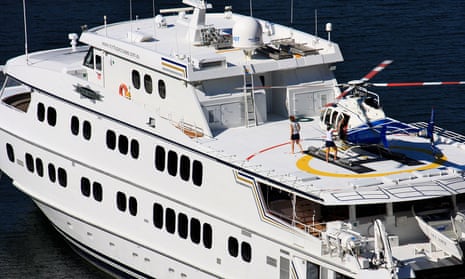A cruise operator has alleged a government bureaucrat advised it to sack its Australian staff and hire foreign crew on cheaper wages to remain competitive under the Coalition’s proposed new shipping laws.
When the North Star Cruises Australia owners’ representative Bill Milby asked transport department officials how that fitted with the Coalition’s budget message of supporting small business, they shrugged their shoulders, he said.
A spokesman for the Department of Infrastructure and Regional Development has denied such advice was provided to NSCA.
But Milby rejected their denial and told Guardian Australia: “They did, and if push comes to shove I will say it under oath and I will take a lie detector test.”
The NSCA operates expedition cruise ships such as True North off the northern coast of Western Australia. Milby was present when the deputy prime minister and transport minister, Warren Truss, announced in May the government would deregulate shipping laws to remove “red tape”.
Under Truss’s legislation, workers on non-Australian flagged vessels will only be subject to Australian wages and conditions if the ships trade in Australia for more than 183 days, roughly six months of the yearly permits. It will also streamline requirements to a single shipping licence for boats operating between domestic ports.
Milby said in answer to his question, Truss had denied it would make Australian ships uncompetitive. He then took it up with the minister’s officials, telling them his company would struggle to compete because foreign ships would operate with costs of between 50% and 70% lower than Australian-owned and crewed vessels.
“The [department] executive director’s advice to me during that discussion was if NSCA wanted to remain competitive with the foreign-owned and crewed ships it should – quote ‘consider taking our ship True North off the Australian Shipping Register, re-register the ship in a suitable foreign country, lay off our Australian crew and hire a cheaper foreign crew’ unquote,” Milby said in a submission to the Senate committee considering the legislation.
“When she suggested this I told her that I could not believe the suggestion she made and she said quote ‘to remain competitive in the world that is what we should do’ unquote.”
Milby was so shocked he arranged a meeting in Canberra with the department in June to further discuss the legislation, given foreign crew are paid one-third of Australian wages. The company told a departmental officer that foreign shipping firms did not have to pay payroll tax, superannuation, workers compensation, holiday pay or for seafarers insurance or training requirements.
“I asked ... how they expected Australian expedition ship owners such as NSCA to compete with the foreign-crewed ships and remain in business and they suggested the following:
“1. First take True North off the Australian Shipping Registry.
“2. Register True North in a foreign country, and, reflag our ship True North with a foreign flag.
“3. Then replace the Australian crew (apart from the captain and chief engineer) with foreign crew who would not be governed under the Australian labour laws and the Australian Fair Work Act.
“4. The foreign crew would also be trained in a foreign country – not Australia, saving more money.
Milby’s submission went on: “I asked how they could justify this course of action which will threaten not only NSCA but also all of the Australian ships and ferries that trade on the whole Australian coastline and their answer was, ‘Australia is part of the international market and we have to compete with international operators.’
“I asked them how they could justify the negative impact this new legislation will have on all of the small businesses and supporting businesses in regional Australia, especially after the 2015-16 budget announced by the prime minister and treasurer, where they both placed a big emphasis on small business being the backbone of the Australian economy and the budget measures were proof of the government’s support.
“All I got from both of them was a shrug of the shoulders.”
Truss’s department denied giving such advice.
“The department did not provide this advice,” a spokesman said. “The Australian government is working to build a more competitive and efficient shipping industry and is committed to reforming coastal shipping.”
The other concern of the shipping company was that foreign ships would not have the same respect for the pristine environment of much of the Australian coastline as local operators.
The NSCA submission said when the company had raised the environmental concerns with the department, the federal bureaucrat suggested it was a state government problem.
“So it would appear that if the new coastal trading legislation goes through, the federal government will subrogate any environment issues – of which the potential is enormous – to the states to sort out,” the submission says.
When the company raised the issue with the West Australian deputy premier and tourism minister, Kim Hames, NSCA received a letter from him suggesting the changes would result in broader economic benefits as a result of opening up regional ports to foreign vessels.
While Hames acknowledged he was concerned at the potential impact on the WA environment, he suggested a more appropriate response was to exclude “smaller passenger vessels from any relaxation of the current legislation”.
Labor, the unions and other Australian shipping companies have expressed their concern at the legislation, which is now before the Senate standing committee on rural, regional affairs and transport. The committee is due to report on the bill in October.
The ongtime Liberal party member Peter Cadwallader, of the Intercontinental Shipping Group, which operates bulk carrier ICS Silver Lining, said in his own submission that jobs and tax revenue would be lost to Australia as a result of the legislation.
“As a longtime member of the Liberal party (nearly 50 years), I am aware that the focus of Coalition policy is jobs and growth,” he said. “Both of these objectives will be sacrificed by this bill in direct contradiction of Coalition policy.”

Comments (…)
Sign in or create your Guardian account to join the discussion